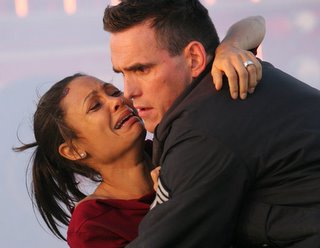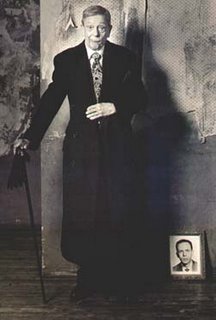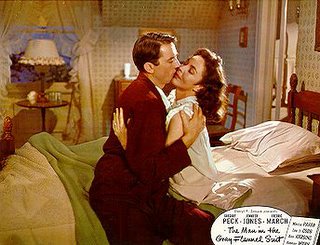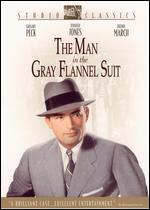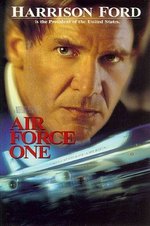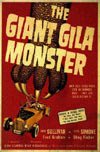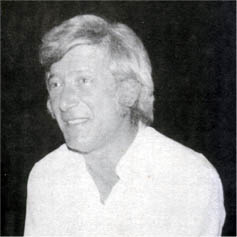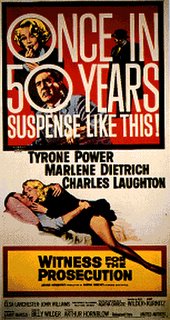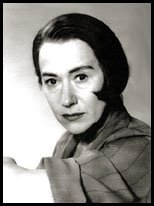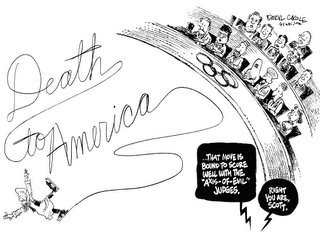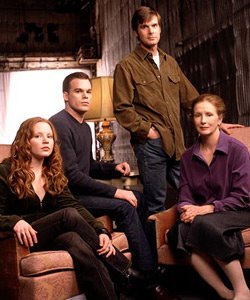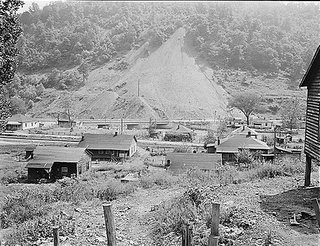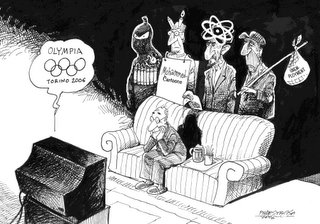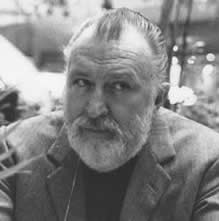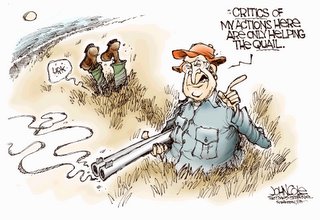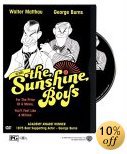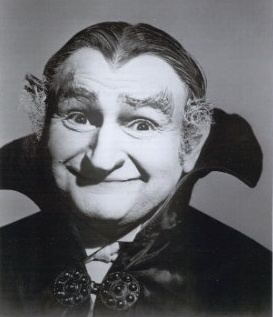 A West Wing Word
A West Wing Word
The picture that leads this post is of
President Josiah Bartlet and
former President D. Wire Newman attending the funeral of the late President Owen Lassiter in January of 2004. As none of the presidents in this photo are rea,l and in '
The West Wing universe' 2004 was not a presidential election year, some major skewing of historical events is required to make the shows time line work. Now
there are a number of theories on when and how events in
The West Wings chronology deviated from those that occurred in acutely reality, but so as to simplify my task I will only present my preferred solution to the shows 'time problem'. Information presented in this article is taken from episodes of the program itself, the internet, logical extrapolation and my own imagination, this is simply my way of orienting myself temporally to
The West Wings world.
Events in
The  West Wing
West Wings timeline run mostly concurrent with ours into the beginning of
Richard Nixons second term as President starting in January of 1973. In mid 1973 Vice President Sparrow Agnew resigned from office due to a scandal involving his taxes, we assume this event occurred as well in the shows timeline. In November of 1973 Nixon lawyers Fred Buzhardt and Leonard Garment attempted to schedule a meeting with the president in which they intended to render to him there legal advice that he should resign from office due to the Watergate scandal. In the real world Nixon blew-off this meeting, but in our timeline he took it and his lawyers succeeded in convincing him that his chances of completing his term given the circumstances were slim, according Pr

esident Nixon resigned from office that month.
With Nixon having not yet filled Agnews vacancy in the vice-presidency by the time of his own resignation, the office of the presidency fell upon the democratic Speaker of the House Representative
Carl Albert of Oklahoma. Albert, uncomfortable with reversing the republicans landslide victory in the 1972 elections schedules a special election for Tuesday November 5, 1974.
As in our world
Gerald Ford was brought into the vice-presidency because of his near spotless record and ethics, he would have been a logical candadite in this world for republicans wishing to distance themselves from Nixon 1974. In terms of public policy Nixon and Ford were not that different from each other and their politics were pretty middle-of-the-road for the mid 197

0's. We assume that Gerald Ford won the 1974 election (probably against the now incumbent democrat), and became the 39th president of the United States (Albert was the 38th) on an inauguration date of January 20th 1975. Fords presidency also makes sense in that several laws he enacted have been referenced on the show and Donald Rumsfeld has been refereed to as a former white house chief of staff and defense secretary, both positions he held in the real Ford white house. As the constitution prescribes that all presidents be elected to four-year terms the traditional election cycle would be altered by two years from then on.
We assume that the growing strength of the conserva

tive movement within the Republican party that began to take shape with Barry Goldwaters 1964 presidential candidacy occurred in this world as well. Were the fictional Ford presidency to follow a parallel downward trajectory with the real administration (only with two additional years to do so) we could logically conclude that dissatisfied republican voters would deny the sitting president renomination in 1978, much as they almost did in real life in 1976.
Ronald Reagan was the conservative standard barrier who attempted an insurgency within the GOP in 1976, here he succeeded in gaining the nomination and winning the presidency in 1978 (possibly against Ted Kennedy or Jimmy Carter).

To make the timeline work Ronald Reagan (here the 40th president just like in our world) would have been elected in 1978 and re-elected in 1982, the latter campaign probably ending in a similar landslide to his real one in 1984. Assuming at least one Reagan landslide would help to align events with character Bruno Gianellis comment in a 6th season episode the republicans had won 49 out of 50 states in two elections over the last 30 years, Brunos would have made this statement in the spring of 2006 according to my timeline. Ronald Regan must have been president as his name is visable on the side of the D.C. area hospital that President Bartlet was brought to after having been shot in a crowed in mid-2000.

In 1986
D. Wire Newman would become the first democrat elected president since Lyndon B. Johnson in 1964 (Newman may have defeated George H. W. Bush for the office assuming the Texan served as this Reagans VP). The implication is that President Newman was a liberal New England democrat (possibably from Massachusetts) though also roughly analogous to Jimmy Carter. In the episode in which Lassiters funeral was attended President Newman accompanied President Bartlet to the services on Air Force One starting in Washington D.C., so it would be logical for Newman to be from the eastern seaboard as the plane would be making its trip west from Andrews Air Force Base.
President Newman Lost re-election to Owen Lassiter in 1990. President Lassiter was depicted as Reagan/Goldwater type arch- conservative from somewhere in either California or Arizonia (their were palm trees outside of his presidential library and I believe that facility was said to be located in a San something or other). Lassiter was fairly elderly upon taking office and his mind is said to have drifted somewhat during the latter part of his presidency, he suffered from hip problems after leaving office but non-the-less would travel extensively. His cabinet and staff was loaded full of similarly aged conservatives, some of whom were evidentially involved in some major scandals, man of these (mostly) men would still be alive to attend Lassiters funeral in 2004. The Cold War ended during the Lassiter administration.
Owen Lassiter was re-elected (again presumably by a huge margin) against a liberal democratic candidate referred to only as 'Whittaker' in 1994. This paved the way for the 1998 presidential elections which are critical for the show. Coming into the democratic primaries that year the leading canddidates where

Senate Minority Leader
John Hoynes of Texas (a 'moderate' often referred to as "every republicans favorite democrat"), Senator William Wiley of Washington (I'm hopping he was from Walla Walla), and Josiah 'Jed' Bartlet of New Hampshire (a three-term congressman and two-term governor). Hoynes was the odds on favorite to win the democratic nomination that year despite that fact that Bartlet logically had the New Hampshire primary sowed up. Wiley was the first major democratic candidate to drop out of the race, and his exist combined with a surprise victory in the Illinois primary allowed the Bartlet campaign to upset Hoynes and get the party's nomination. John Hoynes was given the VP spot on the Bartlet ticked and the two won a strong (though not overwhelming) victory that November, their oponiate most probably was Lassiters un-named sitting vice-president.
The 2002 campaign fitted Bartlet/Hoynes against the Republican ticket of Florida G

ov.
Robert Ritchie and Jeff Heston of Utah. A retiring 78 year old liberal senator from Minnesota named Stackhouse briefly launched his own 3rd party candidacy for the presidency that year, but withdrew before the general election and endorsed Bartlet (Stackhouse never drew more then 3-4% in the polls but in what was anticipated to be a close election this could have cost Bartlet re-election). After humiliating Ritchie in the races only presidential debate Jed Bartlet won his second term in a sweeping victory, though both houses of congress remained firmly in Republican hands.
In the late spring of 2003 Vice President John Hoynes resigned from office after word leaked that he had a mistress, and that she was writing a tell-all book that would revel that Hoynes had told national security secretes to her (mostly NASA stuff it was nothing to important though it was classified, he later said he had told the women government secrets to impress her). In late May President Bartlets youngest daughter Zoey was kidnapped by Islamic terrorists from the (fictional) nation of Qumar while celebrating her graduation from Georgetown University at a night club (at least one secret service agent was killed in the abduction). Feeling that the situation constituted a conflict of interest in his being able to discharge his duties as both the President of the United States and the father of a hostage, Josiah Bartlet in accordance to provisions within the 25th Amendment temporarily resigned from his office until the crises was over. With these events occurring less then a month after Hoynes resignation the vacant vice-presidents slot dictated that the nations highest office fall to the Speaker of the House, Republican Representative
Glenn 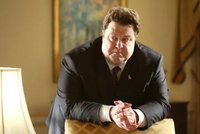 Alan Walken
Alan Walken of Missouri. President Walken was the nations 44th chief executive and served for a total of three days until just after an 'anonymous tip' lead to Zoey Bartlets being recovered by a joint military/FBI raid on the rural trailer where she was being held (I think it was in Virginia). As Congressman Walken had to resign from the house inorder to assume the office of the Presidency he was replaced as speaker by Representative Jeff Haffley of Washington state ( he represents the Spokane area) during the formers brief administration.

In late summer or early fall of 2003 Colorado Congressman
Robert 'Bingo Bob' Russell of western Colorado was confirmed unanimously as Bartlets new vice-president, a compromise pick after the Republican leadership rejected the presidents first choice, controversial Secretary of State Lewis Barryhill. That pretty much brings us up to the current 2006 election (you can read more about that by going to my December archives which contains a lengthy post on the subject). The one thing left to remember is that at some point in the 5th season a year was skipped so that by the last few episodes of that season the year was 2005 instead of 2004 as it should have been. I hope that my wordy explanation has shed some light on the temporal dimention of
The West Wing.
Oh, one last thing I forgot about. Bartlet, Newman, and Walken were the only American Presidents shown to have attended President Lassiters funeral in 2004, therefore it is to be assumed that all of the real Presidents who translate over to the West Wing timeline were either dead by that time or to ill to attended. The only one of the 'real' presidents in this timeline who was dead by January of 2004 would be Carl Albert who passed away in January of 2000. President Alberts death should have thus fallen in the second season of the West Wing, but events on the show at that time would have been to crowed to assume that President Bartlet could have attended his funeral, so he must have died at some other time. Also of note it appears as though Presidents Newmans wife may have been dead at the time of the Lassiter funeral as she does not accompany her husband to the service, though it should also be noted that the living Mrs. Bartlet was not shown at the funeral either (I believe Walken is divorced).
*For a good real chronology of the presidents see the 2000 PBS documentary series 'The American President' which inspired this post.

